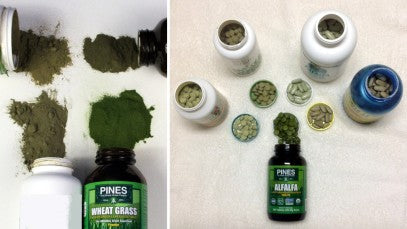With labels removed, the plastic bottles on the right are the three most popular green juice products sold in stores. A spoonful of Pines' Mighty Greens mixed with water is on the left. A similar comparison can be made with any of Pines nutrient-dense green superfoods.

Juice May Not be As Good for You as Thought
The popularity of smoothies indicates a new understanding that whole foods are better than juice. That's because, many consumers now know that whole food fruits and vegetables are prebiotic. Whole food vegetables and fruits still contain natural fiber. They support the growth of probiotic bacteria. Consequently, when fiber is removed to make juice, the juice is no longer prebiotic. It no longer supports probiotic bacteria. Good colon health results from probiotic bacteria which are the "friendly" bacteria that help with digestion. They need whole food with its natural fiber to thrive.
Without whole food fiber, extracted juice can interfere with other aspects of gut ecology. A study by Dr. Eric Martens, Professor of Microbiology and Immunology at the University of Michigan shows one effect. These scientists discovered that juice without fiber can create problems. With the fiber removed, they found that organisms in the intestine eat away at the protective mucosal layer of the gut wall.
Pines nutrient-dense vegetables still contain essential fiber. They are prebiotic. As a result, customers often report improved bowl function. That is not surprising. The primate digestive systems was designed for whole food, leafy green roughage, not juice. Humans are primates. In the wild, primates eat dark green leafy vegetation with natural fiber. As a result, the fiber and nutrients in leafy green provide the proper media and consistency for probiotic growth. That results in better digestion and healthy bowel movements. Our naturally-concentrated, whole food, dark-green leafy vegetable powders are exactly what is missing from most human diets.
Juice in Stores is Mostly from GMO Monopolies
The picture shows three green juice brands, Naked, Suja and Odwalla. Coke, Pepsi, and Goldman Sachs own those brands. Although their labels say "organic," other products from Coke and Pepsi are not. These massive monopolies produce mostly soda pop. They distribute their beverages everywhere on our planet. Their ingredients generally consist of GMO high fructose corn syrup (HFCS) mixed with carbonated water and artificial flavors.
 The popularity of smoothies indicates a new understanding that whole foods are better than juice. Consumers now seek whole foods that are prebiotic.
The popularity of smoothies indicates a new understanding that whole foods are better than juice. Consumers now seek whole foods that are prebiotic.
Pines' Nutrition is Protected by Gentle Drying
We dry our greens at low temperatures. That protects raw food qualities. Further, when moisture is removed from food, spoilage is prevented. Without moisture, bacteria cannot grow. On the other hand, liquid juices spoil very quickly. Consequently, these juice brands must use heat or pressure to kill bacteria to prevent spoilage. That results in a longer shelf life but also devitalizes the juice. Juice experts say we need to consume raw vegetable juice within 20 minutes of extraction for nutritional levels people expect. Killing bacteria with heat or pressure kills the bacteria that would spoil the juice, but it also kills other important enzymes and nutrients associated with raw food.
PINES was Original Green Superfood - Established in 1976
Pines has been a leader in the organic foods movement for more than 40 years. Unlike a GMO monopoly, we are not a multi-national beverage producer with an "organic sideline." Instead, our small family farmers only produce 100% certified organic foods. We have never used herbicides or pesticides and we depend entirely on natural rainfall rather than growing in inappropriate locations that require unsustainable irrigation with contaminated ground water.

Pines was established in 1976 by more than 100 small investors who saw the company as a means to convert more farmland to certified organic and to support sustainable development. Further, they wanted to see the company support environmental causes and feeding programs. The stockholders invested an average of $200 each. Rather than expecting a big return on their investment, they supported the project because they believed in the ideals. They chose the Pine tree as the logo because it is an internationally-recognized symbol of the peace found in nature.

Pines Packaging is Superior to Plastic Tubs and Packets
We package all our products in amber glass bottles with special metal caps. That allows us to remove the oxygen. Without oxygen, green foods cannot lose nutrition through oxidation. Furthermore, even after opening, the consumer can completely seal the contents between uses because of the tight-fitting metal caps.

All greens are good, but Pines' green superfood powders provide what our bodies need at much lower cost. The nutrition in one bottle of Pines costs less than $30 but is equal nutritionally to $300 worth of processed green juices like those three bottles to the right of the Mighty Greens. A serving of Pines' green superfoods can cost as little as 25 cents while a bottle of the heat or pressure pasteurized juice has a suggested retail of $4 per serving.
Pines' products are available at leading natural food stores or direct with our shopping cart. The powders are also great in recipes.




Comments (0)
There are no comments for this article. Be the first one to leave a message!